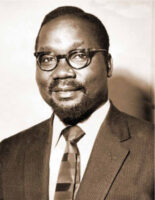
Henry Pius Masinde Muliro was born in 1922 at Matili village, Bungoma, to Muliro Kisingilie and Makinia after whom he was fondly referred to as Owa Makinia or Khwa Makinia.
He was orphaned at a tender age. The mother died in 1928 when he was only six and the father in 1935 on the threshold of his teenage. The name Owa Makinia referred to his maternal lineage but with a whiff of his orphan status. Because of the poverty that marked his early days, the Catholic Church played a major role in Muliro’s formative years. This explains the names Henry and Pius, given to him by the missionaries.
The underprivileged milieu of Muliro’s early years must have been a blessing in disguise. Catholic missionaries took care of his education at Matili and Misikhu primary schools. He sat the Competitive Entrance Examination at the latter.
The missionary educators in Misikhu identified his keen and abiding interest in education and seconded him as one of the few bright boys to Mwiri Intermediate School in Uganda. In 1944, he came back to Kenya to join St Mary’s School Yala, where he sat the Kenya African Primary Education examination. Muliro proceeded to St Peter’s College Tororo, Uganda, in 1947 and passed both the Cambridge School Certificate Examination and the Makerere Entrance Examination in 1948.
After Tororo, Muliro became a popular figure in his native home, having scaled educational ladders that identified him as one of the few enlightened young men among his Bukusu people. He crisscrossed Bungoma spreading the message of education and mentoring young people, an activity noticed by community leaders, who raised funds for his studies in Cape Town, South Africa. The fees and travel were topped up by the missionary benefactors who had held his hand through primary and secondary education.
Muliro was admitted to the University of Cape Town in 1949 for a bachelor of arts degree in education, English, history and political philosophy. He studied for another degree in education. His educational thirst not satiated, Muliro enrolled for a master’s degree course in political science at the same university. His independence of mind would, however, cost him the award of the master’s degree certificate when he refused to tone down his thesis that launched into the racist political set-up of South Africa. At this point, he took a keen and active interest in South African politics, becoming a member of Nelson Mandela’s African National Congress.
Indeed, it was through his participation in ANC politics that he would meet his future wife, Mercia, who survives him to date.
Muliro returned home to Kenya with Mercia in 1954, when he was said to be the fourth most educated African in the colony. He was posted to Alliance Girls High School, then Siriba Teachers Training College, before hanging his teaching boots to plunge into politics, a career he would follow till his death. In the North Nyanza (Western Province) Legco elections of 1957, Muliro triumphed over six candidates, including the then incumbent, Wycliffe Works Waswa (WWW).
